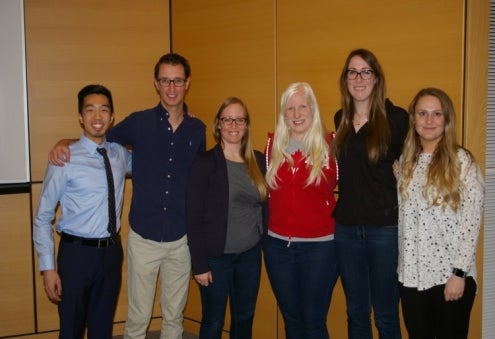The Sports Vision Club (SVC), one of the newer student groups at the University of Waterloo (UW), was established in 2014 to expose optometry students to the exciting field of sports vision and provide them with experience in working with unique athlete populations. Our club aims to educate students on how they can incorporate sports vision into their own optometric practices after graduation. Since our club’s inception, SVC executives have collaborated with Dr. Kristine Dalton to organize vision screening events and seminars throughout the school year.
This year, the SVC aimed to articulate the fact that sports vision encompassed more than just vision training. In contrast to past years, we directed our emphasis towards other important aspects of sports vision clinical practice like concussion management, sports psychology, and visual impairment classification. Dr. William Clarke, an optometrist with experience working with the Ottawa Senators and Renegades, visited the School for our first seminar of the year. Dr. Clarke spoke about neuro-optometry and vision rehabilitation for patients with traumatic brain injuries. During this presentation, he also highlighted the rewards of working with young athletes and the potential impact that optometrists can have on them. In February, Dr. Kimberley Dawson, a Sports Psychologist and Professor of Kinesiology from Wilfred Laurier University, presented a lecture on athlete/sport psychology, namely on focusing attention to maximize physical performance. Members learned about the drive and visual attention that athletes need to compete at their highest potential, and how this mindset can be applied to everyday life to help people succeed.
In March, we hosted a Paralympic classification presentation in partnership with the Canadian Paralympic Committee and the Canadian Blind Sports Association. Chelsey Gotell, a 3-time Paralympian and 12-time Paralympic medalist, was invited to speak about her experience growing up and competing as a visually impaired athlete. Furthermore, Dr. Gordon Douglas, an ophthalmologist who has worked with International Blind Sports Association for almost 40 years as an international classifier, video conferenced with our club to teach members about the challenges and rewards of visual impairment classification at the Paralympic level. Both of these speakers inspired our members with their passionate stories and provided us with motivation to pursue possible futures in visual impairment classification.
We ended our year with a three-day series of varsity athlete vision screenings. SVC members had the opportunity to perform vision assessments on 23 athletes from the UWaterloo varsity ice hockey, volleyball, cross-country, golf, and Nordic skiing teams. SVC members used equipment such as iPad applications, the Sports Vision Trainer (SVT) and the Bassin Anticipation Timer to test athletes’ balance and reaction times. We were thrilled with this experience and gained knowledge of how to test for potential visual conditions that could have on-field consequences. Consequently, our club established baseline data for each athlete that may assist in the case of rehabilitation to any injuries or concussions sustained throughout the season. This baseline data can also be used to track athletes’ improvement through the season.
Overall, the SVC had a successful and eventful year, but has even bigger plans for the future. With Dr. Dalton’s leadership and guidance, we are working towards establishing the School of Optometry and Vision Science as a National Paralympic Classification Centre. This means that athletes from all around Canada will come to our School in order to have their visual impairment classified prior to competing in Para-Sport. Classification is a huge responsibility to ensure fair competition, and we are excited for our students and faculty to become an integral part of this Paralympic movement. Stay tuned for future events to see what our club has planned next!

SVC executive members and Dr. Dalton with Paralympic swimmer, Chelsey Gotell




